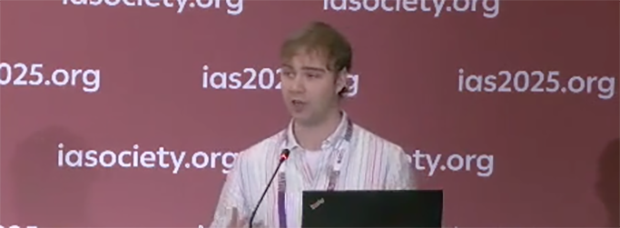IAS 2025: Induced stress can increase HIV dynamics
7 August 2025. Related: Conference reports, Cure-related research, Basic science and immunology, IAS 13th Kigali 2025.


Rory Shepherd at IAS 2025
Simon Collins, HIV i-Base
An oral presentation at IAS 2025 reported that acute psychological stress can affect the viral dynamics of HIV in people on effective ART, increasing viral turnover. [1]
The implications of this are unlikely to have any clinical significance for people on stable treatment but might be a consideration for research into the viral reservoirs.
During the study, psychological stress was induced in 25 men (median age 47, diagnosed for 9 years, 92% gay, 60% white) and this was correlated with changes in viral production and markers of physical stress. Results were presented by Rory Shepherd from the Doherty Institute in Melbourne, Australia.
The study used the Trier Social Stress Test (TSST) during which study participants have to give a 5-minute presentation about their personal strengths and weaknesses in front of a stern, unresponsive white-coated judge and then take a maths test, in which giving incorrect answers leads to a “Wrong, start again” response. This test significantly increased some physical measures of stress, such as salivary cortisol and cardiac measures of flight-or-fight responses.
The impacts on virological markers included significant increases in median unspliced HIV RNA at 65 minutes post-test, although there were no differences in total HIV DNA. Changes in several stress markers also correlated with changes in HIV RNA.
Changes in HIV transcription were not explained but the distribution of CD4 T-cell subsets showed no significant correlation with activation markers, although a significant negative correlation was found between CD69+ and CD8.
The study noted the importance of further research into the impact of stress on the viral reservoir and that this should definitely be in a more diverse population.
This is a fascinating aspect of the impact of social factors on HIV dynamics – and several earlier studies (including one I am sure I reported more than 25 years ago) showed that psychological stress linked to living in social isolation increased plasma and CSF levels of SIV in macaques. [2]
References
- Stern J et al. The impact of acute stress on the HIV reservoir: a prospective interventional trial and analysis in vitro of stress compounds and latency reversal. IAS 2025, 13-17 July 2025. Oral abstract OAA0105.
https://conference.ias2025.org/media-1139-targeting-the-hiv-reservoir-emerging-discoveries-and-novel-interventions (webcast – login required) - Guerrero-Martin SM et al. Psychosocial Stress Alters the Immune Response and Results in Higher Viral Load During Acute SIV Infection in a Pigtailed Macaque Model of HIV. J Infect Dis. 2021 Dec 15;224(12):2113-2121. doi: 10.1093/infdis/jiab252.
https://pmc.ncbi.nlm.nih.gov/articles/PMC8672752

